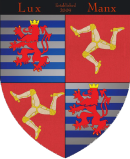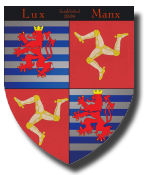Isle of Man
The Isle of Man, or Ellan Vannin, is a self-governing Crown dependency, located in the Irish Sea at the geographical centre of the British Isles. The head of state is Queen Elizabeth II, who holds the title of Lord of Mann. The Crown is represented by a Lieutenant Governor. The island is not part of the United Kingdom but foreign relations, defence, and ultimate good-governance of the Isle of Man are the responsibility of the government of the United Kingdom.
Inhabited for millennia, the island gradually became a Celtic-Norse community as the Norse settled there, starting about AD 850. This has left a legacy ranging from the Tynwald parliament to many local place names.
The three legs refer to the island's motto: Quocunque Jeceris Stabit, traditionally translated from Latin as 'Whithersoever you throw it, it will stand', or 'Whichever way you throw it, it will stand'.
After a period of alternating rule by the kings of England and Scotland, the Manx came under the feudal over-lordship of the English Crown. The lordship revested into the British Crown in 1764 but the island never became part of the United Kingdom and retained its status as an internally self-governing jurisdiction.
Tynwald, the island's parliament, was nominally founded in AD 979. It is arguably the oldest continuous parliament in the world. Annual ceremonial meeting in July on Tynwald Day, the island's national day, continues to be held at Tynwald Hill, where titles are announced and a brief description of the new laws enacted by Tynwald during the previous year is given.
The House of Keys (Manx: Kiare as Feed) is the directly elected lower branch of Tynwald, the parliament of the Isle of Man, the other branch being the Legislative Council. The Manx-language name of the House of Keys is Yn Chiare as Feed ('The Four and twenty) as it consists of 24 democratically elected members.
Woman's suffrage, the right to vote, was granted to women on the Isle of Man already in 1881, many years before women in Great Britain were allowed to go to the polls (1918).
The Isle of Man is in currency union with the United Kingdom, and the Manx pound is a local issue of coins and banknotes denominated in pounds sterling. It can be exchanged at par with other sterling coinage and notes. The Isle of Man Treasury states that the locally issued currency, United Kingdom coinage and Bank of England notes are also all legal tender within the island.
Today 84,497 people live on the Island (Official estimate 2011). Offshore banking, manufacturing, and tourism form key sectors of the economy. Agriculture and fishing, once the mainstays of the economy, now make declining contributions to the Island's Gross Domestic Product (GDP)
The official languages of the Isle of Man are Manx Gaelic and English. A dialect of English known as Manx English is spoken.
The Manx Gaelic language is a Goidelic Celtic language and is one of a number of insular Celtic languages spoken in the British Isles. Manx Gaelic has been officially recognised as a legitimate autochthonous regional language under the European Charter for Regional or Minority Languages, ratified by the United Kingdom on 27 March, 2001 on behalf of the Isle of Man government. The Manx language has become quite popular again on the Island and is experiencing currently revival.
The main and true international motorcycle event associated with the island throughout the world is the Isle of Man TT, which began in 1907 and takes place in late May and early June. It is now an international road racing event for motorbikes and used to be part of the World Championship. The Manx Grand Prix is a motorcycle event for amateurs and private entrants that uses the same Snaefell Mountain Course in late August and early September. Many motorcycle fans come from all over the world every year to join this unique excitement.
The Isle of Man is not a part of the European Union, but has a limited relationship concerning the free movement of goods.


